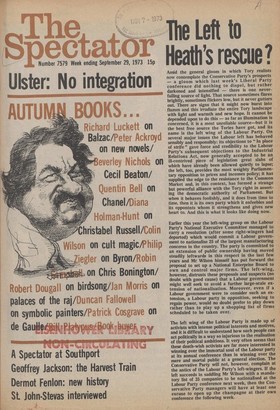The Left to Heath's rescue?
Amid the general gloom in which Tory realists now contemplate the Conservative Party's prospects — a gloom which last week's Liberal Party conference did nothing to dispel, but rather darkened and intensified — there is one neverfailing source of light. That source sometimes flares brightly, sometimes flickers low, but it never gutters out. There are signs that it might now burst into flames and this irradiate the entire Tory landscape with light and warmth and new hope. It cannot be depended upon to do this — as far as illumination is concerned, it is a most unreliable source—but it is the best free source the Tories have got, and its name is the left wing of the Labour Party. On several major issues the Labour left has behaved sensibly and responsibly: its objections to "In place of strife" gave force and credibility to the Labour Party's subsequent objections to the Industrial Relations Act, now generally accepted to be an ill-contrived piece of legislation great slabs of which have already been allowed quietly to lapse; the left, too, provides the most weighty Parliamentary opposition to prices and incomes policy; it has supplied the edge to the resistance to the Common Market and, in this context, has formed a strange but powerful alliance with the Tory right in asserting the democratic authority of Parliament. But when it behaves foolishly, and it does from time to time, then it is its own party which it enfeebles and its oppontnts whom it strengthens and gives new heart to. And this is what it looks like doing now.
Earlier this year the left-wing group on the Labour Party's National Executive Committee managed to carry a resolution (after some right-wingers had departed) which would commit a Labour government to nationalise 25 of the largest manufacturing concerns in the country. The party is committed to an extension of public ownership having moved steadily leftwards in this respect in the last few years and Mr Wilson himself has put forward the proposal to set up a National Enterprise Board to own and control major firms. The left-wing, however, distrusts these proposals and suspects (no doubt with good cause) that a Labour government might well seek to avoid a further large-scale extension of nationalisation. Moreover, even if a Labour government were to consider such an extension, a Labour party in opposition, seeking to regain power, would no doubt prefer to play down rather than to play up a shopping list of firms scheduled to be taken over.
The left wing of the Labour Party is made up of activists with intense political interests and motives, and it is difficult to understand how such people can act politically in a way so injurious to the realisation of their political ambitions. It very often seems that these death-wish activists are far more interested in winning over the immortal soul of the Labour party at its annual conference than in winning over the mere and mortal public at a general election. The Conservative Party will not, however, complain at the antics of the Labour Party's left-wingers. If the left succeeds in saddling Mr Wilson with a mandatory list of 25 companies to be nationalised at the Labour Party conference next week, then the Conservative Party managers will have at least one excuse to open up the champagne at their own conference the following week.










































